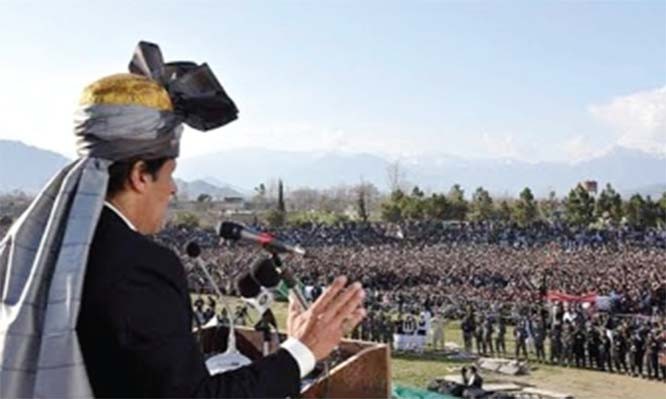
Former Fata is gearing up for its first-ever provincial assembly election

Sitting at a tea stall in the bazaar of Razmak in North Waziristan, a group of young people discusses the upcoming first-ever provincial assembly elections in the tribal areas recently merged with Khyber Pakhtunkhwa. They agree the political space is shrinking for malaks (traditional tribal chieftains) who previously swept elections as independent candidates from the area on the basis of tribal strength, wealth and backing of the political administration.
For the first time in the 2018 elections not a single malak won a seat from the 12 National Assembly seats of Fata, except for the Pashtun Tahafuz Movement’s Mohsin Dawar and Ali Wazir, who are independent candidates as the group is not registered with the Election Commission of Pakistan. The Pakistan Tehreek-e-Insaf (PTI) emerged as a key political party by winning six of 12 NA seats by defeating influential traditional malaks. The Jamiat Ulema-e-Islam-Fazl (JUI-F), that contested the elections under the banner of five-party Muttahida Majlis-e-Amal alliance, emerged as runners-up by winning three seats, and the Pakistan People’s Party won a single seat from Kurram Agency. Two of the PTM central leaders - Dawar and Wazir -- won from North Waziristan and South Waziristan respectively as independent candidates.
The political parties fielded candidates in Fata for the first time in the May 2013 general elections. This was made possible by an amendment to the Frontier Crimes Regulation (FCR) in August 2011, whereby the Political Parties Act (PPA) 2002 was extended to the tribal areas that enabled political parties to field candidates there in the same manner as other parts of the country.
Prior to this regulation, all 12 members of the National Assembly from Fata and the eight members in Senate were elected independently and could not join any political party. In fact, until the introduction of adult franchise in 1996, elections in tribal areas were based on selective voting -- some 35,000 malaks were entitled to cast votes, while the majority sold votes to the highest bidder.
Now all key political parties have started preparation for the first-ever provincial assembly polls on 16 seats from former tribal region after the Election Commission of Pakistan announced on May 6 that polling will be held on July 2. According to the representation determined by the ECP, Bajaur and Khyber will have three seats each in the provincial assembly, Mohmand, Kurram, North Waziristan and South Waziristan two seats each and Orakzai and the Frontier Regions one seat each. In addition four seats are reserved for women and one for a non-Muslim.
However on May 8, Federal Minister Noorul Haq Qadri, who is also a PTI MNA from Khyber, told the media that all 12 MNAs from Fata met leaders of treasury and opposition parties who had agreed to increase the general seats from 16 to 24 and reserve seats from five to six, "a bill will soon pass in the assembly," he said. If it materialises, the provincial assembly elections may get delayed for a few weeks.
Journalist Mureeb Momand says even though the political parties challenge the traditional political system, still "some malaks are in a position to win provincial assembly seats with constituencies smaller than National Assembly’s."
He adds some of them, "such as Noorul Qadri (from Khyber) and Munir Orakzai (from Kurram)" joined the PTI and JUI-F respectively before the last general elections and also won. "But now just before the elections more malaks have joined political parties."
After the PTI won most of the seats from former Fata, three senators -- Aurangzeb Khan, Sajjad Hussain Turi and Mirza Mohammad Afridi -- met the PTI leader on August 27 and joined his party. Another senator Hidayatullah Khan (from Bajaur) announced to join the party two days later.
Jamaat-e-Islami is the only party so far to have nominated candidates for the provincial assembly elections. Most of the candidates, including malaks, are vying for tickets from the PTI, which has formed a three-member parliamentary committee, comprising KP Chief Minister Mahmood Khan, the party’s Central Secretary General Arshad Dad and Federal Minister Qadri. PM Imran Khan, along with CM Mahmood Khan, federal and provincial ministers, has been visiting the area regularly to prepare for the upcoming provincial polls.
"The PTI will face problems in awarding tickets for former tribal districts because there are so many contestants on each seat," says the party leader in Bajaur who requested anonymity. However, he admits, the party’s old guard have concerns about the new entrants, especially malaks, who may win tickets for the upcoming election.
The JUI-F, which strongly opposed the merger of Fata with KP, is an influential political party in the region. Chief Maulana Fazlur Rehman recently spoke to a big rally in North Waziristan and the party is planning to organise more rallies after Eid. Analysts believe that they are still in a good position in South Waziristan, North Waziristan, Kurram and Frontier regions.
Although the PTM announced it is a non-electoral group, candidates backed by its central leaders Mohsin Dawar and Ali Wazir will be able to show strength in the polls in North Waziristan and South Waziristan.
Similarly, the JI, which contested election not under the MMA banner in Bajaur, became runners up with two National Assembly seats in the 2018 polls. The party is likely to perform well this time too.
The PPP, which played a key role in the Fata reforms, is now limited to one National Assembly constituency of Kurram, drawing its support from Parachinar’s Shia population, and to some extent from parts of Bajaur because of its leader Akhundzada Chatan.
The Awami National Party is also planning to make inroads in the former tribal region and is mainly focused on Bajaur, Mohmand and Khyber districts.